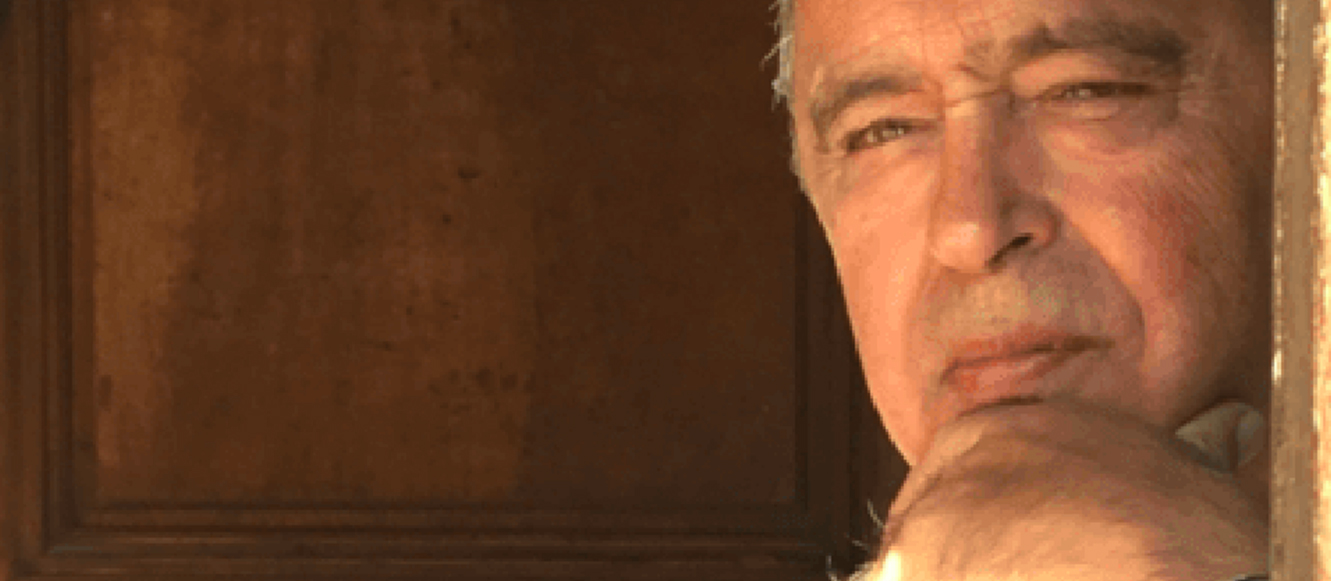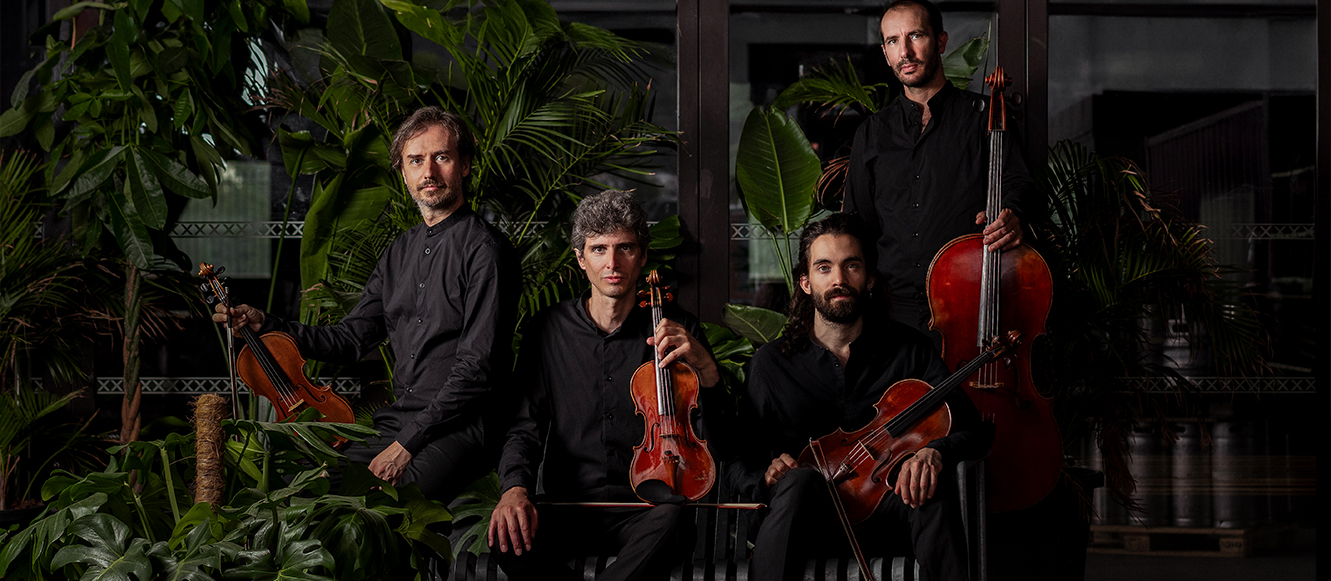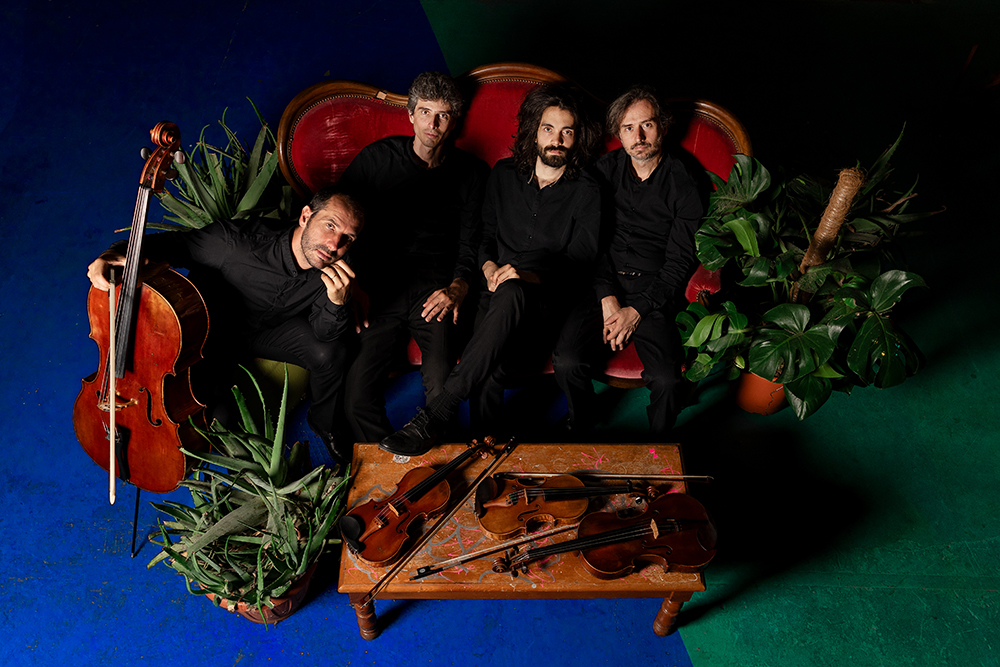For this concert, the Béla Quartet opened its suitcases for an evening in Marseille...
He found Henry Fourès' striking work Un bel éclair qui durerait, for quartet and augmented percussion. The piece explores the possibilities of the strings' acoustic discourse, in dialogue with the virtuoso art of percussionist Jean Geoffroy, who in addition to his infallible instrumental technique, transmutes the natural choreography of the hands into unheard-of sounds.
Following on from this, the four musicians will play the piece written by Robert Pascal for the Quatuor Béla, Obscure Lumière, in memory of the victims of the Camp des Milles during the Second World War, in resonance with the Hymne des Milles composed in 1939 by Adolf Siebert, then in detention at the Camp des Milles. The composer's refined music has been ardently defended since his early days, when Robert was still teaching at the Conservatoire National Supérieur de Lyon. His highly personal style combines rigorous writing with inspired, humanist poetry.
Last but not least, Francesca Verunelli, a singular creator recognizable by all, offers the Quatuor Béla the premiere of her new string quartet. Following her Unfolding for quartet and electronics, anyone familiar with her art will expect music with diaphanous, adamantine textures. Rich in possibilities, this is a work that will sometimes open with rich, scintillating polyphony, sometimes with sharp, delirious rhythms.
-
Francesca Verunelli - Creation 2024
Henry Fourès – A Beautiful Lightning Bolt That Would Last
In the publishing catalogues of the last thirty years, there are few works in quintet, combining percussion and string quartet. This is because the questions raised by this device are numerous, relating as much to the nature of the project as to the type of formal structuring that it induces and that is linked to it, and to the choice of the various writing strategies to be implemented. The string quartet is an instrumental device that is both "cultural" and "symbolic", in relation to which everyone can immediately situate themselves. In contrast, percussion can then appear as a "monohedron", an inverted world, offering an infinite number of devices (here: phonolites, wooden blades, balafon, hi-hat pedal, bamboo, Tibetan bowls, wooden and metal drums, etc.).
From the conception of the project, it seemed to me that writing had to abdicate part of its power of control, ceding "mastery" to the anadyomene ambiguities that the real-time transformation of percussive sounds could maintain with the quartet.
It's a bit like painting on damp paint in the process of drying, to better grasp the vitality and exalt the material in its insubstantial contingency, at the same time as the idea that drives the project into the immediacy of its realization.
Un bel éclair qui dure is commissioned by Ircam-Centre Pompidou, carried out with the help of Augustin Muller, a computer music director at Ircam.
Robert Pascal - Obscure Lumière
To write a short piece for string quartet in resonance with theHymne des Milles- that was the initial proposal I received from the Quatuor Béla. Accepting the project without hesitation, I was faced with an unknown challenge: how to integrate into my composition music I didn't yet know, and which was coming to me from outside. To be meaningful, the fit had to be broad and deep. Odile Boyer, deputy director of the Fondation du Camp des Mille-Mémoire et Education, made this possible by introducing me to and understanding the site of the camp itself, and by proposing for my reading - among other things - "The Devil in France", a very touching autobiographical account by the German writer Lion Feuchtwanger, who was interned in the camp before being able to escape in 1940. All this may have brought me close to those who lived in the camp at the time, many of them artists and intellectuals, and my composition is driven by an instinctive sympathy for them, especially the musician Adolf Siebert, who wrote the Hymn under such difficult conditions. Obscure lumière is permeated by his song. At least in a subterranean way, because there's no point in composing in the hope of gaining recognition for a song that the majority of the public doesn't know anyway. Nevertheless, the composition allows the Hymn to emerge clearly from the musical framework, just as for the internees, light could emerge from darkness.
The Quatuor Béla is subsidized by the DRAC Auvergne-Rhône-Alpes, the Région Auvergne-Rhône-Alpes and the Département de la Savoie. It receives support from SACEM, ADAMI, SPEDIDAM, CNM, ONDA, Maison de la Musique Contemporaine and ProQuartet. It is a member of Futurs Composés and FEVIS.
The Quatuor Béla is also an associate artist of the MC2 in Grenoble and a member of the Collectif La Machine in Lyon.
Mention < CRÉATION > de Francesca Verunelli
Co-commande Philharmonie de Paris, Milano Musica,, L’Oreille Droite et GMEM.
Mention Obscure Lumière by Robert Pascal
Commissioned by the Festival d'Art Lyrique d'Aix-en-Provence and the Quatuor Béla, based on theHymne des Milles, composed in 1939 by Adolf Siebert, then in detention at the Camp des Milles.

Henry Fourès was born in Coursan, Aude, France. He studied art history at the Université Paul Valéry in Montpellier, and music at the CNSM in Paris (harmony, counterpoint, fugue, analysis and composition), then at the University of Berlin (medieval musicology) and the Vienna Academy (piano). Trainee at the Groupe de Recherche Musicale (GRM INA) from 1975 to 1977. From 1977 to 1980, he taught improvised music at the Conservatoire de Pantin. From 1980 to 1982, he taught medieval musicology at the Université de Toulouse le Mirail.
Béla Quartet
For the past 16 years, "the enfants terribles of the French quartet" have been writing a singular journey, between tradition and modernity. Attached to the ancient repertoire of the string quartet, which they defend within the classical programs of excellence in France and abroad (Philharmonie de Paris, Mariinsky Theatre, BeethovenFest...), the musicians of the Quatuor Béla are committed to inscribing the tradition of the string quartet in contemporary musical life.
Their work in commissions and creations with composers of different generations (Francesca Verunelli, Misato Mochizuki, Noriko Baba, Kaija Saariaho, Philippe Leroux, Francesco Filidei, Benjamin de la Fuente, Jean-Pierre Drouet, François Sarhan, Daniel D'Adamo, Thierry Blondeau, Marco Stroppa, Jérôme Combier, Garth Knox, Karl Naegelen, Frédéric Aurier, Robert Hp Platz, Aurelio Edler-Copes, Frédéric Pattar....) was awarded the Prix de la Presse Musicale Internationale in 2015.
It is with sincere conviction, guided by the personality and work of Béla Bartók, that the quartet imagines encounters with eclectic personalities. A case in point is "Si oui, oui. Sinon non" with cult rocker Albert Marcoeur, "Impressions d'Afrique" with the late griot Moriba Koïta, "Jadayel" with Palestinian masters Ahmad Al Khatib and Youssef Hbeisch....
In recent years, the Quatuor Béla, renowned for its "diabolical technique" (Télérama) and its musical commitment, has willingly placed itself at the service of early 20th-century Central European composers such as Janáček, Schulhoff, Krása, Bartók, Szymanovsky and Webern.His discography has been acclaimed by international critics (ffff Télérama, Luister 10 Award, Gramophone Critic's Choice Award, Prix Charles Cros, Diapason, Le Monde...).
Jean Geoffroy
Jean Geoffroy made his debut as solo timpanist with the Ensemble orchestral de Paris from 1985 to 2000, then as soloist with the Ensemble Court-Circuit. He also developed a career as a soloist, giving recitals all over the world.
Highly committed to creative work, he is the dedicatee of numerous works for solo percussion, including pieces by Ivo Malec, Thierry De Mey, Pierre Jodlowski, Philippe Leroux, Bertrand Dubedout and Yoshihisa Taïra, Bruno Mantovani, Philippe Hurel, Martin Matalon, Luis Naón, François Paris, Yan Maresz, Daniel Tosi, Bruno Giner, Frédéric Durieux, José-Luis Campana, Éric Tanguy, Michèle Reverdy, Jacopo Baboni-Schilingi, Suzanne Giraud, Xu Yi and François Narboni. He has taken part in some thirty recordings, including five devoted to Johann Sebastian Bach, featuring the complete suites, partitas and sonatas for solo instrument.
He also conducts various ensembles in France and South America, notably the Instrumental Ensemble of the National University of Colombia, the Namascae Ensemble and the Mésostics Ensemble.
Jean Geoffroy was artistic director of the Centre International de Percussion de Genève Eklekto from 2007 to 2013, and then of Les Percussions de Strasbourg from 2015 to 2017.
In 2019, he founded LiSiLoG with Christophe Lebreton, a structure dedicated to artistic innovation and transmission.
President of the Geneva International Percussion Competition 2009 and guest juror at numerous international competitions, he is a member of the reading committee of the Institut de recherche et coordination acoustique/musique.
Francesca Verunelli
Francesca Verunelli studied composition with Rosario Mirigliano and piano with Stefano Fiuzzi at the Conservatorio Nazionale Luigi Cherubini in Florence, graduating summa cum laude. She completed her studies at the Santa Cecilia Academy in Rome, with Azio Corghi.
She then studied electronic music at IRCAM. That same year, she was awarded the "Leone d'argento" at the Biennale di Venezia.
She has received commissions from major music institutions and festivals, including Ircam, NeueVocalsolisten Stuttgart, Biennale di Venezia, Orchestre Philharmonique de Radio France, Milano Musica, Accentus Chamber Choir, Lucerne Symphonic Orchestra, Court-Circuit, Festival d'Aix-en-Provence, GMEM Marseille, CIRM Nice, l'Etat français, FACE Foundation, Wittener Tage für Neue Kammermusik, International Contemporary Ensemble, Donaueschinger MusikTage, ECLAT, Orchestre Philharmonique du Luxembourg, Klangforum Wien.
She has been composer-in-residence at Ircam, GMEM Marseille, Casa de Velasquez (Madrid - 2015/2016) and Villa Médicis (Académie de France à Rome - 2016/17).
In 2020 she was awarded the prestigious Siemens Composer's prize.
Robert Pascal
Robert Pascal was born on June 3, 1952 in Salon-de-Provence, where he began learning the violin with Auguste Freismuth. He continued his studies at the ENM in Créteil, in violin with Michel Rulleau, and in writing and analysis with Hélène Breuil. At the CNSM de Lyon, he benefited from Raffi Ourgandjian's invaluable teaching in writing, accompanied by Yvette Grimaud's fundamental courses in ethnomusicology (DNESM in 1985). His music is deeply marked by his encounter with these two musicians. During these years, he also worked as a conductor with Jean Giardino and Pierre Dervaux.
He taught mathematics for several years in classes préparatoires aux Grandes Ecoles, before devoting himself entirely to music. Before completing his studies at the CNSM in Lyon, he began teaching there in 1982, when he created the "Bases scientifiques pour les techniques nouvelles" class. Until 1999, he taught this discipline, supplemented by analysis of the twentieth-century repertoire in a class entitled "Techniques musicales du XX° siècle". Between 1992 and 1995, Gilbert Amy, then Director of the CNSMD de Lyon, entrusted him with the artistic responsibility of "L'Atelier du XX° siècle", a student ensemble devoted to the contemporary repertoire. He was professor of composition at the CNSMD de Lyon from 1999 until his retirement in 2014.
He participates in the activities of the GRAME studio, Centre National de Création Musicale (Lyon), where he creates his pieces with electroacoustic devices, focusing particularly on the relationship between the performer and the electroacoustic part. In 2018, he won the "Pierre-Jean Jouve" composition competition. His works have been performed in France and abroad, in Belgium, the Netherlands, Germany, Austria, Poland, Switzerland, Italy, Spain, Portugal, Canada, Colombia, Mexico and China. He has led numerous master-classes and conferences on an international scale.
As a musician, he was a member of the "Musiciens pour une planète partagée" (Musicians for a shared planet) collective, committed to the collective construction of a fairer, more sustainable world. He lived in Provence, a land dear to his heart, and left us in November 2022.
Robert Pascal never defined his music by belonging to any school, nor did he seek to categorize it.
Augustin Muller
Augustin Muller continued his training at the Conservatoire National Supérieur de Musique et de Danse de Paris, from which he graduated in 2010.
Specialized in computer music and sound broadcasting, he works in France and abroad with various artists and ensembles (Le Balcon, Ensemble intercontemporain, L'Instant Donne, Links, International Contemporary Ensemble...) for concerts and festivals (ManiFeste, Venice Biennale, Musica, Berlioz Festival, Présences...).
Coming from a generation directly confronted with the question of the interpretation of the mixed repertoire, he has been working at Ircam since 2010 for concert, research and creation projects with many composers (Levinas, Platz, Carreño, Foures, Eldar...), musicians and performers, and is involved in several projects in terms of sound diffusion and live electronics, notably with the orchestra Le Balcon.
In 2014, he created the electronics and sound design for the opera The Little Prince by Michaël Levinas for the Opéra de Lausanne, the Opéra de Lille and the Théâtre du Châtelet.
Attached to the spatial dimension of sound, in 2017 he arranged Pierre Henry's Dracula with Othman Louati and Le Balcon, and continues to work with Pedro Garcia-Velasquez on the notion of sound spaces and acoustic theatre.
Ircam
Institute for Research and Coordination of Acoustics/Music
The Institute for Research and Coordination in Acoustics/Music is today one of the largest public research centres in the world dedicated to musical creation and scientific research. A unique place where artistic foresight and scientific and technological innovation converge, the institute is directed by Frank Madlener and brings together more than one hundred and sixty collaborators.
Ircam develops its three main axes – creation, research, transmission – during a Parisian season, tours in France and abroad and an annual event, ManiFeste, which combines an international festival and a multidisciplinary academy.
Founded by Pierre Boulez, Ircam is associated with the Centre Pompidou under the supervision of the Ministry of Culture. The STMS (Science and Technology of Music and Sound) Joint Research Unit, hosted by Ircam, is also supervised by the CNRS and Sorbonne University.
In 2020, Ircam created Ircam Amplify, its company for the commercialization of audio innovations. A true bridge between the state of the art of audio research and the industrial world at the global level, Ircam Amplify is part of the sound revolution in the 21st century.
Friche la Belle de Mai (Petit Plateau)
41 Jobin Street13003
Marseille
DURATION
1h
RATES
One-off €6
Modulations loyalty card €30*
Limited number of seats
*Gives access to all Modulations in the season 23-24
PRACTICAL INFORMATION
Latecomers will not be admitted to the theater, as some shows do not tolerate late entries - at the Producer's request.
TICKETS
Online: gmem-cncm.mapado.com
By e-mail: billetterie@gmem.org
On site: on the day of the performance, half an hour before the show, subject to availability.
IN THE FRAMEWORK OF MODULATIONS
What are Modulations?
Concerts, performances, regular events...
In other words, a season organized by GMEM.
1st semester dates:
16/01 - 20/02 - 03/03 - 19/03 - 16/04 - 12/05
Quatuor Béla
string quartet
Jean Geoffroy
percussion
Augustin Muller
Ircam Electronics
Clément Cerles
Ircam sound diffusion
WORKS OF
Francesca Verunelli
< CRÉATION 2024 > — 15 min
Robert Pascal
Obscure Lumière - 5 min
string quartet, on "Hymne des Milles".
Henry Fourès
Un bel éclair qui durerait - 30 min
quintet for string quartet and augmented percussion



